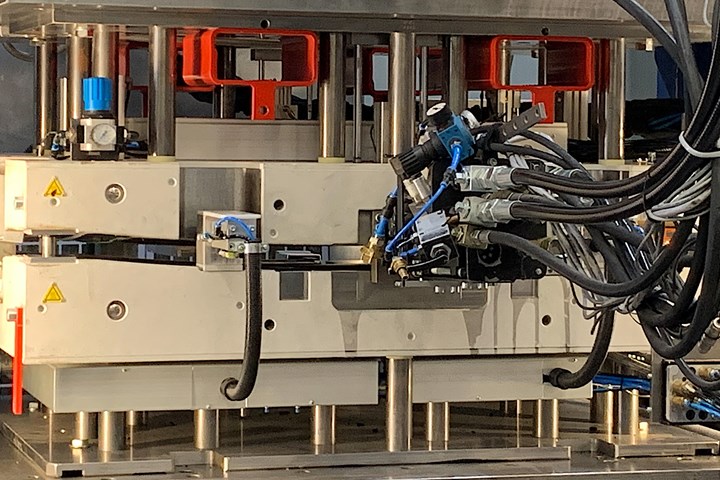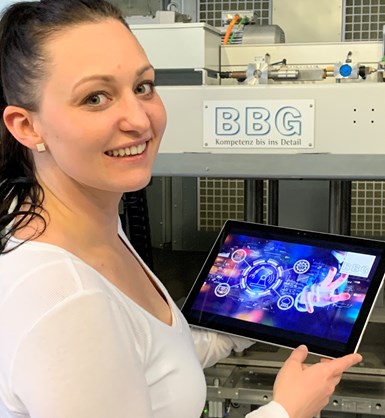Composites mold manufacturer, BBG, is finalist for Germany’s best toolmaker 2020
Smart molds for Industry 4.0 applications key to its recognition in “Excellence in Production” competition.

Photo Credit: BBG
It was reported on Nov. 24 that (Mindelheim, Germany), a manufacturer of molds, machinery and plants, presented smart molds for use in Industry 4.0 applications and in smart factory environments. The company is among the finalists in the "Excellence in Production" competition for Germany’s best toolmaker in 2020. BBG’s molds are designed and developed to process polyurethane, PVC, TPE and other elastomers, as well as a wide range of composite materials. This includes production processes such as PUR-CSM (PUR Composite Spray Molding), LFI (Long Fiber Injection), RTM (Resin Transfer Molding), SMC (Sheet Molding Compound) or GMT (Glass Mat-reinforced Thermoplastics) (see “BBG presents self-closing HP-RTM molds for CFRP compact hydrogen tank production”).
According to BBG, the smart molds, can be used, for example, in encapsulation molds for refining glass and polycarbonate sheets with polyurethane, or for manufacturing components on the basis of the PUR-RIM process. Furthermore, it is said to be suitable for all types of molds used to produce safety-relevant or Class A components that place high demands on the manufacturing process and documentation. Smart molds also facilitate fully automated production lines. Typical customers include manufacturers from the automotive, pharmaceutical, and aerospace industries, who are required to document the production data of components due their obligation to produce proof of production.
According to BBG, smart molds reduce the cost for material and energy consumption while increasing productivity and process accuracy (see “Composites 4.0: Digital transformation, adaptive production, new paradigms”). In addition, the process data required for documentation can be gathered for every component and can be stored long-term. To this end, the molds are equipped with a large number of sensors that collect data on process parameters such as temperature, flow velocity and pressure during the entire manufacturing process. Special sensors developed by BBG are also able to detect metallic inserts in steel molds reliably, ensuring validated measurements even with the panes inserted.
Further, BBG says information can be processed on-site at the mold or forwarded to the higher-level control systems of other production lines. Any deviations from the target values specified are displayed and can be corrected immediately. Furthermore, the correct sequence and the performing of work steps can be specified and can be controlled by the mold itself. In this way, an operator always knows that the work steps have been carried out correctly in the specified order, and which ones will be next.

The data collected in intelligent molds can be processed and displayed directly on-site or forwarded to the control systems of other production lines, such as mold carrier systems or encapsulation equipment. Photo Credit: BBG
“Smart molds are at the top of our wide range of products, which starts with simple and cost-efficient prototyping molds,” says Hans Brandner, the managing partner. “What the customer needs is what counts for us. We develop the right mold customized to meet every requirement.”
According to Brandner, BBG’s strict focus on customer benefit is also key for the renewed success at the "Excellence in Production" competition. BBG has been nominated this year for the second time after 2018, as one of the best toolmakers in Germany. In the category "External toolmaker with fewer than 50 employees,” BBG once again made it to the top three. The winner was announced at the online award ceremony on Nov. 18.
“Excellence in Production" is organized by the Werkzeugmaschinenlabor WZL of the Rheinisch-Westfälische Technische Hochschule (RWTH) and the Fraunhofer Institute for Production Technology, which are both headquartered at Aachen,Germany. Around 300 specialized companies and in-house corporate departments regularly participate in the competition, which has been organized every year since 2003, and compete against each other in four different categories.
Related Content
First Airbus A350 crash confirmed in Haneda
Shortly after touch-down, a JAL A350-900 aircraft recently collided with a De Havilland Canada Dash 8. Exact circumstances are still unknown.
Read MoreDevelopment of a composite liquid hydrogen tank for commercial aircraft
Netherlands consortium advances cryogenic composites testing, tank designs and manufacturing including AFP, hybrid winding, welding of tank components and integrated SHM and H2 sensors for demonstrators in 2025.
Read MoreWelding is not bonding
Discussion of the issues in our understanding of thermoplastic composite welded structures and certification of the latest materials and welding technologies for future airframes.
Read MoreOtto Aviation launches Phantom 3500 business jet with all-composite airframe from Leonardo
Promising 60% less fuel burn and 90% less emissions using SAF, the super-laminar flow design with windowless fuselage will be built using RTM in Florida facility with certification slated for 2030.
Read MoreRead Next
Ultrasonic welding for in-space manufacturing of CFRTP
Agile Ultrasonics and NASA trial robotic-compatible carbon fiber-reinforced thermoplastic ultrasonic welding technology for space structures.
Read MoreScaling up, optimizing the flax fiber composite camper
Greenlander’s Sherpa RV cab, which is largely constructed from flax fiber/bio-epoxy sandwich panels, nears commercial production readiness and next-generation scale-up.
Read MoreCeramic matrix composites: Faster, cheaper, higher temperature
New players proliferate, increasing CMC materials and manufacturing capacity, novel processes and automation to meet demand for higher part volumes and performance.
Read More












